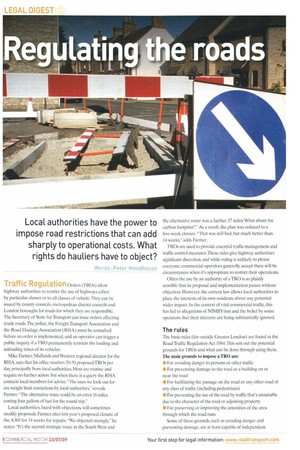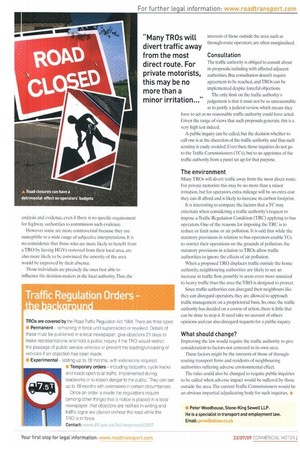Local authorities have the power to impose road restrictions that
Page 28

Page 29

If you've noticed an error in this article please click here to report it so we can fix it.
can add sharply to operational costs. What rights do hauliers have to object?
Words: Peter Woodhouse Orders (TROs) allow highway authorities to restrict the use of highways either by particular classes or to all classes of vehicle. They can be issued by county councils, metropolitan district councils and London boroughs for roads for which they are responsible. The Secretary of State for Transport can issue orders affecting trunk roads. The police, the Freight Transport Association and the Road Haulage Association (RHA) must be consulted before an order is implemented, and an operator can trigger a public inquiry if a TRO permanently restricts the loading and unloading times of its vehicles.
Mike Farmer. Midlands and Western regional director for the RHA, says that his office receives 20-30 proposed TROs per day, principally from local authorities. Most are routine and require no further action, but when there is a query the RHA contacts local members for advice. "The ones we look out for are weight limit restrictions by local authorities," reveals Farmer, "The alternative route could be an extra 16 miles. costing four gallons of fuel for the round trip."
Local authorities, faced with objections, will sometimes modify proposals. Farmer cites last year's proposed closure of the A303 for 14 weeks for repairs. "We objected strongly," he states."It's the second strategic route in the South West and the alternative route was a further 37 miles. What about the carbon footprint?" As a result, the plan was reduced to a five-week closure. "That was still bad, but much better than 14 weeks," adds Farmer.
TROs are used to provide essential traffic management and traffic control measures.These rules give highway authorities significant discretion, and while ruling is unlikely to please everyone, commercial operators generally accept there will be circumstances when it's appropriate to restrict their operations.
Often the use by an authority of a TRO is so plainly sensible that its proposal and implementation passes without objection. However, the current law allows local authorities to place the interests of its own residents above any potential wider impact. In the context of vital commercial traffic, this has led to allegations of NIMBY-ism and the belief by some operators that their interests are being substantially ignored.
The rules The basic rules (for outside Greater London) are found in the Road Traffic Regulation Act 1984. This sets out the potential grounds for TROs and what can be done through using them. The main grounds to impose a TRO are: • For avoiding danger to persons or other traffic • For preventing damage to the road or a building on or near the road • For facilitating the passage on the road or any other road of any class of traffic (including pedestrians) • For preventing the use of the road by traffic that's unsuitable due to the character of the road or adjoining property • For preserving or improving the amenities of the area through which the road runs Some of these grounds, such as avoiding danger and preventing damage, are at least capable of independent analysis and evidence, even if there is no specific requirement for highway authorities to commission such evidence.
However some are more controversial because they are susceptible to a wide range of subjective interpretations. It is no coincidence that those who are more likely to benefit from a TRO by having HCiVs removed from their local area, are also more likely to be convinced the amenity of the area would be improved by their absence.
Those individuals are precisely the ones best able to influence the decision-makers in the local authority Thus, the
interests of those outside the area, such as through-route operators, are often marginalised.
Consultation
The traffic authority is obliged to consult about its proposals, including with affected adjacent authorities But consultation doesn't require agreement to be reached, and TROs can be implemented despite forceful objections.
The only limit on the traffic authority's judgement is that it must not be so unreasonable as to justify a judicial review, which means they have to act as no reasonable traffic authority could have acted. Given the range of views that such proposals generate, this is a very high test indeed.
A public inquiry can be called, but the decision whether to call one is at the discretion of the traffic authority and thus such scrutiny is easily avoided. Even then, those inquiries do not go to the Traffic Ck-mimissioners (TCs), but to an appointee of the traffic authority from a panel set up for that purpose.
The environment
Many TROs will divert traffic away from the most direct route. For private motorists this may be no more than a minor irritation, but for operators, extra mileage will he an extra cost they can ill afford and is likely to increase its carbon footprint.
It is interesting to compare the factors that a TC may entertain when considering a traffic authority's request to impose a Traffic Regulation Condition (TRC) applying to bus operators. One of the reasons for imposing the TRC is to reduce or limit noise or air pollution. It is odd that while the statutory provisions in relation to bus operators enable TCs to restrict their operations on the grounds of pollution, the statutory provisions in relation to TROs allow traffic authorities to ignore the effects of air pollution.
When a proposed TRO displaces traffic outside the home authority, neighbouring authorities are likely to see an increase in traffic flow, possibly in areas even more unsuited to heavy traffic than the area the TRO is designed to protect.
Since traffic authorities can disregard their neighbours like they can disregard operators, they are allowed to approach traffic management on a proprietorial basis So, once the traffic authority has decided on a course of action, there is little that can be done to stop it. It need take no account of others' opinions and can also disregard requests for a public inquiry.
What should change?
Improving the law would require the traffic authority to give consideration to factors not centered in its own area.
These factors might he the interests of those of throughrouting transport firms and residents of neighbouring authorities suffering adverse environmental effect.
The rules could also be changed to require public inquiries to be called when adverse impact would be suffered by those outside the area. The current Traffic Commissioners would be an obvious impartial adjudicating body for such inquiries in








































































































































